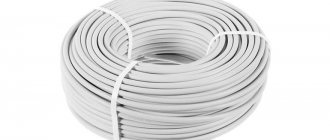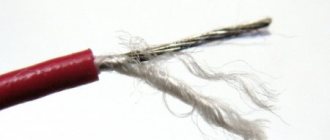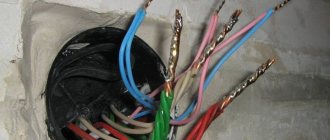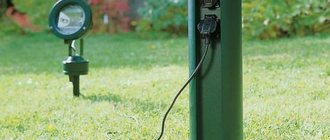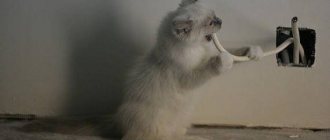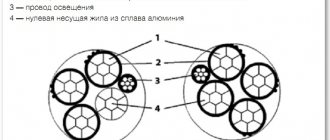Collect in large bunches
Collect all the cables into one thick bundle using a tie - quite often this is enough, because the pet is not interested and uncomfortable in gnawing on something that does not fit in its mouth.
What not to do
Do not blindly trust advice, especially advice from the Internet. Serious websites and specialized forums gather mainly knowledgeable and responsible people. Social networks are a completely different matter.
Thus, there is widespread advice to spray a cat chewing wires with water from a sprayer. Supposedly, this will scare away the animal. But what if at this moment the animal’s teeth have already gnawed through the sheath and touched the cable? Water is an excellent conductor, and an electric shock to an animal, as well as a short circuit, can be a natural result of such “protection”!
There is also no need to scold and shame the animal: most likely it will perceive this as a new game or simply will not understand why they are angry with it.
We protect wiring in the country and in the house from rodents and pets
Animals that can damage your energy system can be divided into two categories: rodents and pets. Rodents can chew off the protective layer of insulation, which will then lead to a short circuit and the death of the mouse or rat. In this article I will tell you how you can protect your wiring from unexpected guests.
We fight rodents
If the wiring was carried out on the ceiling or on the subfloor, then this network (without appropriate protection) is at risk.
There are three ways to protect electrical wiring from the negative effects of pests:
First.
This is to completely redo the wiring and hide it in the walls of your home. Unfortunately, this method is not suitable for buildings made of wood.
Second.
Implementation of new wiring in a specialized corrugated sleeve or in metal pipes. Suitable for all existing types of buildings.
Third.
Performing new wiring from armored cable.
I specifically omitted upgrading the old wiring, because if you notice this problem, then there is already a very high probability that the wires are already damaged and pose a great danger. Therefore, there is no point in covering up cracks and holes and hoping that the wiring will serve without problems.
How to solve a problem with a cat and wires in one day
To ensure that the cat never tries to tamper with the wires again, you can improve the folk method of “damaging taste.” After all, the modern cosmetics industry produces bitter (and at the same time not harmful to health) children's nail polishes (for example, “Gnaw - I don’t want to”, “Nekusayka”, Belweder). They are bought by parents whose children will not stop biting their nails or sucking their fingers - and as a result, children often give up the bad habit in the first week of using varnish. In addition to specialized products, medicinal or strengthening varnishes and enamels, which contain quinine, are also used for this purpose.
These products are no less effective on cats. In most cases, just one wire treatment is enough - and after that you can forget about “gnawing” forever.
The varnish is applied in a thin strip along the entire length of the wire. There is no need to coat it entirely - in order to make a bite, the cat will still have to grab the entire wire, and the bitterness will be clearly felt even if there is just a little bit of varnish. In this case, the varnish:
- conveniently applied to the wire using a “standard” brush;
- it is consumed very economically (one bottle is more than enough to process all the wires in several apartments);
- after drying, it does not stain your hands, does not leave marks and does not interfere with the use of wires for their intended purpose;
- does not wear off and retains its “bitter” properties for a long time - this way the cat has time to firmly understand that it is not worth putting wires in its mouth.
With the help of such a remedy, you can quickly wean off chewing wires, even those cats in whom this habit has been ingrained for a long time and very firmly.
Hide annoying wires
The home of most modern people is filled with a variety of wires and adapters - in the room it is necessary to simultaneously connect many components of a computer and a laptop, the TV can work and the phone can be charged at the same time, and a table lamp and floor lamp must be plugged into the socket. In the kitchen, it is necessary for several appliances to work simultaneously - a mixer, toaster, stove, oven, kettle and much more. All this is good, but if the wires coming from each electrical appliance are not in order, they entangle the space like snakes, not only making it difficult to walk and not stumble, but also taking up space.
These convenient holders for wires, as shown in the photo, are called plug hubs and are sold in many hardware stores
By carefully arranging all the wires, you will forget that you can trip over the wire - this is especially important if there is a child in the house. Well, those who keep pets can relax and forget about the problem of chewed wires
How to stop your cat from chewing wires
Not all, but some kittens are attracted to hanging wires in the house: telephone, computer, audio and others. All other pranks of pets, such as turning over flowerpots, holes in curtains, torn wallpaper, are not comparable in their danger to chewing live wires. Therefore, if an animal has such a bad habit, it is necessary to wean it off. It’s worth thinking in advance about how to protect him from injury or, worse, from death.
Cable chewing can cost a cat's life
Applying a special product to the wires
As you know, cats do not like strong and unpleasant aromas, for example, the smell of citrus. Therefore, veterinarians recommend treating cats’ “favorite” wires with a special spray, for example, Antigryzin. It has a sharp citrus aroma, thanks to which the cat will not come close to its “toy”. In addition, the product can be used to treat all places or objects that are threatened by your pet’s claws or teeth. You can purchase the spray at any veterinary pharmacy.
Important! Caring for the safety of the animal will help avoid death
Hiding the cables
This method 100% guarantees that the animal will not get to its “toys”. To do this, you do not need to leave, for example, headphones or a phone charger freely available to your pet. All hanging wires need to be hidden as much as possible, or pushed behind the baseboard. Then the animal and equipment will be completely safe.
Wiping wires with repellers
Folk remedies work 100% as a repeller. An excellent option would be to rub the cables in the house, for example, with lemon peel or aloe juice. Lemon has a pungent smell that cats cannot tolerate, and aloe juice has a bitter taste that the pet will not like and the cat will no longer go near its “toys.”
"Anti-gryzin" for wiping wires
Games and toys for your pet
In most cases, kittens begin to chew wires due to the absence of owners and complete loneliness. Therefore, before asking yourself the question of how to stop a cat from chewing electrical wires, you should first take care of the variety of his leisure time.
You need to try to build a play area for the animal where he can spend time. It is worth buying him a variety of balls, squeakers and other entertainment items.
Advice! In addition to purchasing toys, you need to devote maximum of your free time to your pet.
Protection from cats, dogs and other pets
In a residential area, power lines must be protected from pets that live hand in hand with humans - cats, dogs, rabbits and hamsters. The most pressing problem is the category of kittens and puppies who love to play with absolutely anything that attracts them, including the electrical cable. To them, a dangling or dangling wire seems like an ordinary toy that they just want to play with.
To avoid damage to insulation by pets, use the following measures:
- Treat the cable with a special spray that acts as a repeller for cats, dogs and other animals. The main disadvantage of this method is the specific smell, which can become an obstacle not only for the animal, but also for its owners.
- If protecting the wires with a spray does not suit you, rub the wires with natural spices with a strong smell - pepper, citrus fruits, vinegar, detergent, etc. It’s unpleasant for pets to even be near such aromas, so they will be happy to stay as far away from the wires as possible.
- For protection, wrap the wire with double-sided tape - such braiding is extremely unpleasant for both cats and aggressive dogs. In addition to scotch tape, regular foil will work for the braid, which will also become a barrier for pets.
- Another great way to protect yourself is to raise the wire higher on the wall or furniture, where it will become inaccessible to the animal. In most cases, this can be done without installing additional dowels and auxiliary structures. Rice. 3: example how to lift the wire
- Another protection option is to rearrange the furniture. All interior elements must be positioned in such a way that they cover hanging wires or simply hide cords and carriers behind already installed chairs, cabinets and sofas.
- In addition to the above options, you can use regular toys as an alternative to play. Bright “pets” with a squeaker or bell will be much more attractive for your dog or cat than electric wires.
Rodent protection
The issue of interaction between rodents and wires is most relevant in those buildings where the wiring was laid in a natural niche formed by the floor, ceiling covering or two wall planes, for example, sheets of plasterboard, plastic, etc. This arrangement of the wires was due to the ease of hiding the line and maintainability in case of damage. Of course, cable burnout most often occurs at the connection points, and not on a solid wire laid in the wall. But pests in the form of rats and mice use such voids to move, where lying wires become victims of their teeth.
Subsequent search for damage and repairs take a lot of time due to the need to disassemble the entire structure, be it a wall, ceiling box or floor.
To avoid such cable damage, you can use one or several protection methods at once:
- To protect the wire in the floor, fill it with a concrete screed; if you consider filling the entire space impractical, you can limit yourself to a block only around the cable line; Rice. 1: fill the wire with concrete
- In addition to the cable tie, you can install a metal pipe or metal corrugation to protect the wires; such a design will also make it inaccessible to rodents; Rice. 2: use metal corrugation
- To protect the line in open areas, you can install an armored cable; despite the high cost of such a product, it will definitely be too tough for pests;
- To protect wires in ceiling niches, it is important to seal all cracks and access points to voids to prevent rats and mice from entering them;
- For protection in the ceiling, even at the stage of laying the route, you can make a separate hole for the wiring, which will prevent the insulation from being chewed through.
If you have already installed wires and you are not planning a major renovation of the premises, you can use electronic repellers that affect rodents. Such ultrasonic repellers are not felt by humans, so they do not disturb the usual comfort. They can be installed both along the entire perimeter for preventive purposes, and selectively, where their placement is most relevant in your case.
Wire protection devices
Another way to protect wires from a cat is to use protective devices. You can buy them in electrical goods stores or make them yourself - for example, put the wires in a regular plastic hose or a self-sewn case. In hardware stores you can find special boxes or braids. And on Amazon you can buy Chewsafe or CritterCord protective coverings - they are made in the form of a transparent flexible tube that will prevent the animal from biting the wire, and also have an unpleasant citrus scent.
Dangers and solutions
In a modern apartment or private house, many things pose a danger to a fragile puppy. But don’t be alarmed, they all turn into safe things with relatively little effort.
Wiring.
One of the most dangerous moments, since a young dog can easily chew through the insulation and receive an electric shock. Therefore, all wires should be removed either to an inaccessible height or under the baseboard. If this is not possible, then hide all the wires that the puppy can chew in a piece of metal or metal-plastic pipe. An ordinary box made of thin plastic is not suitable for these purposes; it not only may not withstand the pressure of teeth, but is also capable of crumbling into sharp fragments.
Fragile interior parts.
Vases, flower pots, decorative porcelain figurines and grandma's favorite dinnerware, as soon as the growing dog starts running around the house, everything that can be broken will be broken. Therefore, place fragile and breakable items at a higher location or secure them securely. A vase falling on a puppy means not only the loss of a favorite thing, but also a risk of injury for the pet, as well as great stress for him.
Chemistry
. This includes all kinds of vials, jars and bottles with shampoos, cosmetics or detergents. All of them have a pungent odor that will definitely not remain without the puppy’s interest, and ingestion of household chemicals can lead to serious poisoning. The way to solve the problem is the same as in the previous paragraph - put it higher or securely lock it in cabinets.
Open balcony and windows
Do not leave them open; if the dog is left alone at home without supervision, it may accidentally fall out. If the puppy is small, then no bars will save you, the dog will easily squeeze between the bars, and the instinct of self-preservation at an early age may not be enough to assess the danger of falling from a height
Remember, a dog cannot land on its feet like a cat.
Doors.
Pinching a tail or paw is the least of the troubles; a heavy door suddenly and abruptly closing can threaten your pet with a spinal fracture. Therefore, either remove the springs from the doors until the dog grows and gets stronger, or install special stops and spacers so that the doors do not close completely.
Shoes.
Yes, the most ordinary street shoes in which you come home also pose a considerable danger to the puppy. The fact is that along with dirt, dangerous bacteria stick to the sole, which can cause serious damage to the puppy’s weak body. While the dog is still small, all vaccinations have not yet been completed and the immune system has not strengthened, it is better to hide all outdoor shoes in a cardboard box and put them away higher.
Bin.
Not only can the puppy happily throw trash around the house, but he can also choke on something, so it’s worth hiding the bucket more securely. In general, everything that gives off a tasty smell should be safely hidden from the dog.
Floor.
If it is slippery, then when the puppy grows up, he may develop incorrect paw placement due to the fact that he was constantly trying to maintain balance. Of course, it’s not a good idea to completely re-cover the flooring before a dog arrives in the house, but laying down paths or rugs wouldn’t hurt.
All these safety measures should be taken before the puppy even crosses the threshold of your home, and adhere to them until the dog grows up. After this, it will no longer be necessary to protect it from housing, but to protect housing from it.
Home ideas
In this section you can see life hacks for the home and kitchen that will not leave you indifferent.
For lovers of musical instruments
Now many people have started working remotely and pursuing their favorite hobbies online, but what if their main hobby is music? In order not to disturb your neighbors when playing the piano, simply cover the instrument with a thick blanket. This is a proven life hack that works perfectly in panel houses.
DIY mini vacuum cleaner
If you don’t have compressed air on hand to clean your PC and components, a mini vacuum cleaner made from a regular hair dryer will help you. Before you make a life hack from a hair dryer, be sure to check whether your device can work without heating. If yes, then take a regular sheet of paper and stationery tape.
Cut the cheese into thin slices
Having trouble cutting hard cheese into thin slices? It's simple, use a special knife for peeling potatoes. This way you will cut the cheese perfectly and you won’t have to buy additional tools.
Universal lid for jars
Lost your jar lid or damaged it? Don’t rush to throw away the container or look for a suitable lid. Use a cool life hack with a balloon. More details:
prepare any jar;
inflate the balloon;
bring the ball to the neck of the jar;
Next, gradually open the valve so that the ball begins to descend.
When the balloon is completely deflated, it will seal the jar hermetically.
Removing ink stains
Using easy life hacks at home can work wonders. Namely: if you stain your clothes with ink, do not rush to throw away the item or use thermonuclear detergents. Milk will help you with this, but this trick will only work on fresh stains. Dip the contaminated fabric into a container of milk and wait until the ink comes off on its own, and at the end just wash it as usual.
Cooking cracked eggs
Came home from the store and noticed that several eggs were cracked? It doesn’t matter, they can be saved and you don’t have to make scrambled eggs out of them. These home hacks will help you boil cracked eggs:
take food bags and wrap eggs in them;
place the food on the bottom of the pan;
add cold water;
bring to a boil;
you're done, all you have to do is remove the packages.
Here's another trick: add table salt or a little vinegar to the water.
Add shine to chrome parts
Here's another useful home hack that will update your chrome parts. For non-removable elements, use regular lemon, and for removable elements, use vinegar. Such products can freshen up faucets, shower heads, siphon screens and other similar chrome parts.
DIY runner
Lost or broke the slider on your wallet? Then use this clever lifehack - a tin can eyelet. In appearance, it is no different from a classic runner.
What methods are not recommended?
We have already reviewed the most effective and relevant methods, but besides them, you may have heard about others. Some of them will be useful, and some may be harmful.
Among these methods, never use:
- Wean your cat off with water. In some sources you will find recommendations to use a water pistol or mug to scare off cats when they chew on wires. Yes, this animal is really afraid of water and after several water procedures, they will give up such an idea. But do not forget that there are live elements nearby that can shock both the animal and you through the same water.
- Installing cables with poisonous impregnation of the outer insulation - this method actually drives rodents away from electrical wiring, but the chemicals evaporate from the surface into the surrounding space. If such wires are installed at industrial enterprises in cable wells and mines, where people are not exposed to the toxic effects of poisons, their installation is justified. But at home, they can harm household members.
- If you want to wean not a cat or a dog, but a chinchilla or a rabbit, from the cable, then for these animals you should never treat the cords with detergents or other chemicals. They practically do not react to such aromatic influence and can easily chew the wire. Even if you notice their actions in time, your pet will simply be poisoned by toxic chemicals.
Since the above options for protecting wires from pets should not be used, it is better to choose safer methods from the arsenal available to you.
https://samelectrik.ru/kak-zashhitit-provodku-ot-gryzunov-i-domashnix-zhivotnyx.htmlhttps://lifehacker.ru/kak-zashhitit-provoda/https://www.asutpp.ru/zaschita- provodov-ot-koshek-gryzunov-i-sobak.html
The cat chews the wires
Many people complain that their furry pets constantly chew through various wires. I am surprised and even outraged by how indifferent and lazy people are. They worry more about their things than about the life of the animal.
If the cat chews the wire, then you are to blame, not the cat. You cannot punish or beat an animal for this. These will not achieve anything, but will only cause physical and mental injury. It is IMPOSSIBLE to beat a small and defenseless animal!
Try to distract the cat from this activity. You can try scaring the cat with compressed air from a can to clean the computer from dust. Usually cats are afraid of this, because... Hissing sounds in a cat's language mean threat. But this is also not a solution, because... cats are very smart and cunning. They may chew on wires when you don't see it.
What to do if a cat chews wires?
Perhaps your cat lacks substances such as vitamins, iron, or taurine, which is why there is a need to chew something. Buy her some rubber toys. More often with her. Maybe the cat is chewing the wires from lack of attention.
We have one cat who chews everything: cardboard boxes, furniture, and wires. How many keyboards and computer mice he damaged, only we know. Unfortunately, it’s too late to re-educate him, because... He came to us as an adult. But how he ended up with us is a different story. But there is an assumption that he was thrown out of the window precisely for this bad habit - chewing wires.
I had to buy a wireless mouse and keyboard. I just can’t find the headphones yet. You have to be constantly on guard and remember to hide everything.
What we didn't do. They smeared the wires with mustard and rubbed them with aromatic oils, but all this was not convenient, and did not last long.
There are many things in our apartment that are different from everyone else's. For example, we never leave shoes on the floor. Everything is hidden in special drawers. Clothes are also hidden, otherwise they cannot be cleaned of cat hair.
We even turn off the gas constantly, after one day one of the cats jumped on the gas stove and somehow opened one of the taps. It's good that this happened with us. We have all the wires either under the ceiling, or in special protective boxes or in rigid corrugated tubes. Yes, it’s not always convenient, but we are calm about the lives of our pets.
If the wires are not hidden in cable channels, it is quite difficult to protect them from sharp cat teeth. Punishments for “gnawing” usually do not bring results - it is quite difficult for the animal to explain what it has done wrong. Preventive actions - such as splashing water or loud bangs at the moment when the cat encroaches on the wire - are more effective, but only in situations where the owner of the house sees what his pet is doing.
Therefore, for weaning it is usually:
- use repellent sprays with an unpleasant odor for cats;
- wipe the wires with a slice of lemon, lemon juice or citrus essential oils (most cats do not like the smell of citrus fruits);
- lubricate the wires with bitter aloe juice or rub with bitter products (garlic, mustard, pepper sauce, etc.).
The last method can perhaps be called the most effective: “repellent” odors do not affect all animals, but no one likes to endure bitterness in the mouth. However, coating wires with bitter products is a rather lengthy and labor-intensive process, especially considering that the protective layer must be “renewed.”
The cat chewed the wires - what to do?
If the cat does chew the wires, there is no need to shout or swear at it. Any punishment will lead to the fact that the pet will be offended and begin to harm out of spite. If a furry bully is caught chewing on cables, you can clap your hands or make some loud noises to scare the animal away.
The sooner you stop your cat from accessing the wires, the better it will be for everyone.
Then you need to check the integrity of all wires. It must be remembered that a damaged cable can cause a fire, and therefore it is better to repair it immediately. After checking, you need to remove all wires that your cat might chew from within reach to avoid further damage.
To prevent a similar situation from happening again, it is necessary to analyze the pet’s behavior. To do this, you can answer a number of questions:
How long ago did this start? Did the purr's diet change during the period when he began to show interest in cords? Is there enough time for your pet? Do his owners often play with him? Does your cat have toys to which she can turn her attention?
Weaning off wires can take quite a long time and the older the animal, the longer it will take for him to wean off the habit. Therefore, owners of inquisitive cats need to be patient and try to identify the root cause of their pet’s behavior.
Re-educating a cat will take months, so you should be patient.
If the cat shows interest not only in the wires, but also itches on toothbrushes and combs, then it needs to be shown to the veterinarian. Most likely, she simply has problems with her teeth, which is why she tries to scratch her gums. The veterinarian will be able to examine the purr, clean the teeth, and also determine whether the animal is eating a sufficiently balanced diet.
If the cat chews everything that is allowed and what is not allowed, then you need to think about going to the cat dentist
Eliminate the cause of this behavior
An animal can damage wires, furniture, and wallpaper for many reasons. Perhaps he is stressed from moving, or he is bored alone, perhaps he is tormented by the owner’s child. It is worth carefully monitoring the animal, at what moments it has the desire to gnaw on everything. Some animals are very active by nature and if they do not manage to expend energy during the day, they begin to become stressed, which manifests itself in this way. Perhaps your pet has very few toys, then it’s worth purchasing several different ones so that he can switch from wires to them. In any case, such behavior signals a lack of attention.
Source
Wire insulation methods
Get ready for the fact that cats are very stubborn and are able to reach the cable in the most impossible ways.
The simplest and most effective means of protecting cables is their insulation. It helps protect the integrity of the cable and reduces risks to the animal's health.
Table 1. Wire insulation methods
Method Implementations and Notes
Cleaning
All unused wires must be removed out of reach of the animal. Chargers can be hidden in a closet, in a table or on a high shelf. And those cables that are used less than a few times a week can be put away in a special box
Tubes
The most convenient way is to hide constantly used wires in special tubes. Cats also show interest in cables because they are small in size and therefore easy to chew on. Tubes for wires are sold at building supply stores. They are large enough that cats cannot damage them, making them great for protection.
Ties
Ordinary construction ties can also help insulate cables. When the diameter of the wire increases, the purr becomes uninterested in playing with it, and it becomes more difficult to chew on it. Therefore, this method also helps to protect the cables and put them in a certain order.
Fastening to furniture
Those wires that cannot be removed and hidden are recommended to be secured to the furniture as much as possible so that they do not dangle. To do this, you can use a construction stapler or special fasteners.
Skirting boards
An excellent way to insulate is baseboards. Modern models have special sections for wires. If there are no such compartments, you can disconnect the baseboard and lay the cable under it. This method will not only protect the pet, but also preserve the aesthetics of the room.
Treatment with special substances
There are a number of substances whose smell repels cats
But here it is important to maintain a golden mean - not to choose scents that will make the owners feel unwell and at the same time periodically refresh the treatment
Double sided tape
Cats really do not like sticky substances and surfaces, and therefore one of the insulation methods can be called double-sided tape. Your pet is guaranteed not to play with the sticky cable
But this method has its drawback - dust and pet hair will constantly collect on the sticky surface, and therefore the wire will quickly look untidy
Foil
Despite the fact that foil can rustle interestingly and shines quite brightly, cats do not like to play with it. The reason for this is the alkaline taste that appears when you chew it. Therefore, this method can also be used as protection for cables. But there is a possibility that the animal's interest will be renewed after the foil is removed
Effective protection against pets
If we look at situations with pets, the main problem is not even the destroyed cord, which must be restored or replaced, but the fact that your pet can be electrocuted. Therefore, it is simply necessary to take all possible measures to protect not only the wiring from animals, but also the animals from the wiring.
Here are the main methods of protection:
- You can grease the wires with pepper in order to discourage the cords. Many people recommend wiping cords with detergents, but they can harm the animal;
- in veterinary stores you can buy a special product that, with its smell, drives pets away from “high-risk” areas;
- try to hide all cords by “covering” them with furniture;
- You can protect the cables by wrapping them with double-sided tape or tin foil;
- during repairs, provide for the passage of the cable line at such a height that pets cannot reach it;
- Apply simple training methods, every time the animal is about to approach the cord, interest it in the toy. Thus, an elementary reflex will help: when the pet sees the wiring, it will remember its favorite toy and look for it.
Many would-be advisers recommend spraying an animal approaching the cord with water. Not only is this a mockery of a pet, it is also quite dangerous, since we are talking about electricity after all.
Stopping your pet from chewing wires
Cat owners should not ignore their pet’s increased interest in cables, because it can lead to disruption of the gastrointestinal tract due to fragments of insulation or the wire itself getting into the digestive tract. And increased interest in the cords of electrical appliances can cause an electric shock, which can lead to the death of a pet.
Chewed wires mean not only lost internet, but also cat poisoning
There are several ways to stop your cat from playing with wires:
- Remove wires from view.
If the pet does not see the cable, it will not have the desire to play with it; Furniture stores offer many gadgets that allow you to hide wires from a cat's gaze. - Place chargers and headphones at a level inaccessible to the animal. It is also better to insulate the gaps between the wall and household appliances, because cats are able to crawl through even a small hole to reach their favorite toy;
- The use of special repellers with a characteristic odor.
Such a substance can be ordinary mustard or lavender oil. Their smell is unpleasant to the animal, and therefore it will not play with things that smell like that. Another excellent remedy is citrus essential oil - orange, lemon, tangerine or grapefruit. Special substances contained in citrus peels repel cats. If there is no essential oil, you can simply rub the wire with lemon peel. This method is very convenient, but the smell needs to be refreshed periodically, because it gradually disappears. More information about smells that repel cats can be found on our portal; Ordinary lemon peels placed in the area of the wires will help keep them intact - Use of special veterinary sprays. One of these means is “Anti-gryzin”;
- Use of aloe.
Aloe juice is very bitter, and therefore the cat, once confronted with it, tries not to chew the tasteless wires anymore. But such a remedy can provoke excessive salivation, and therefore after using this method it is recommended to rinse the animal’s mouth. Since they don't like to rinse it, drinking plenty of fluids is a good alternative; Aloe juice has a similar effect on a cat's sense of smell as lemon peels. - Sharp sounds. Often, owners manage to form a conditioned reflex in the animal, causing hostility towards wires. For example, you can make unpleasant sounds or clap your hands as soon as your pet approaches the cables. For the same purpose, you can attach various rustling toys to them so that they scare away the cat;
- Adjusting your diet.
By making up for the deficiency of vitamins and microelements, owners deprive the pet of the need to look for them in unusual places - wires, house plants; Sometimes it is enough to diversify your pet’s diet to distract him from eating objects not intended for food. - Taking special vitamins. Pharmacies sell vitamins for cats that chew wires. These drugs are produced in the form of various hard sticks, pebbles, and tablets, which animals love to chew. In this way, they cleanse teeth of plaque, massage gums and receive necessary nutrients;
- Purchasing special toys for your pet. Having a variety of interesting toys, the cat begins to show less curiosity about things that are not intended for play.
On the forums you can find advice that it is better not to use:
Severe reprimand of cat behavior
The animal most often does not understand that it is harming something important and putting its life in danger. In its understanding, it is just playing, and therefore may be offended by being scolded. As a result, his interest in wires can only intensify, because the cat will begin to chew them to spite the owners;
As a result, his interest in wires can only intensify, because the cat will begin to chew them to spite the owners;
Excessive swearing will not pacify the animal, but will rather lead to the cat’s desire to take revenge on you.
Use of water. On the Internet you can find a recommendation to spray water from a spray bottle or water pistol at a cat when it plays with the cable. According to the logic of those who advise, such a measure helps to form a conditioned reflex in the animal. But it is strictly forbidden to use water in this case - it is an excellent conductor and, if the integrity of the cable sheath is damaged, it can cause a short circuit and electrocute the pet.
A spray jet aimed at a cat near the wires can result in a short circuit and the death of the pet
Methods for weaning kittens from playing with wires
It is better to start taking action as soon as the cat shows interest in the cables. The longer he is allowed to play with the wires, the more difficult it will be to wean him off. There are several proven methods that will help stop this “disaster”.
Special sprays
A special anti-gryzin spray is sold in veterinary stores. The liquid has a citrus scent that repels cats. You need to spray the reins with anti-gnosis and the kitten is unlikely to want to approach them after that
The same drug can be sprayed onto other objects from which the cat’s attention should be diverted.
Wire insulation
If possible, it is better to hide all cables. Today there are many special devices that allow you to disguise wires: cable channels, tubes, corrugated tunnels.
Of course, not every home can use such structures. Therefore, the method is proposed as one of the options.
Use of improvised means
Strong odors will help stop your animal from chewing wires. Cats absolutely can't stand scents.
- citrus fruits;
- cinnamon;
- vinegar;
- ammonia;
- colognes.
Any of these products can be used to treat the wire and the animal will not come close to it. It is also useful to rub the cable well with something extremely unpalatable to the cat: mustard, hot pepper, aloe juice.
Sound repellent
Many people know that cats do not like loud noises and are very frightened by them. If your cat is chewing on wires, you can try tying a loud baby rattle to them. When the cable moves, it will make a sound and scare away the pet.
Ways to protect wires from pets
Try to eliminate the cause of the addiction
First of all, you should try to eliminate the cause of the fascination with wires:
if the animal is teething, offer it bones or other treats that can be chewed. It is very likely that a new activity will make him forget about wires.
Everyone needs attention; without love and affection, both animals and people can become seriously ill. If the owners are not at home, it is worth trying a variety of toys for pets: labyrinths with toys, mice made of fur, special feeders, bells, etc.
If there is a suspicion of a lack of vitamins and minerals (dull coat, watery eyes), it is necessary to introduce additional microelements and vitamin supplements into the animal’s diet. Your veterinarian will tell you which ones.
Make wires and cables tasteless
A variety of sprays with unpleasant, from an animal’s point of view, taste and smell work well. Home remedies like lemon and orange juice, cinnamon and foil wraps are also sometimes effective.
Coating the wires with safe, bitter-tasting children's nail polish helps. The key word for all these ways to keep wires safe is safety. Sprays, varnishes and everything else must be safe not only for animals, but also for people.
Special devices for protecting cables from pets' teeth
Hide all wires and cables
Without finding such attractive wires in sight, the animal will soon forget about them. And switch to something else. You can hide the wires using special devices:
- attach to the back surfaces of furniture using special fasteners.
- hide in baseboards or ceiling cornices.
Rodents and cable
Even very high-quality cables tend to lose their functionality. And one of the common reasons for this is rodents. What is the reason for such love of rodents for cables? After all, they are not tasty at all, and in principle, they are not edible. The fact is, rats and mice need a dog to grind down their rapidly growing teeth.
And it doesn’t matter to them what it is: pieces of wood or an electric cable. Animals do not understand the dangers associated with electric shock or the harm associated with damaged cable networks
In the best case, insulation damage leads to an increase in leakage currents, and then to tripping of the RCD with further repair of the network. At the same time, searching for damage and its subsequent elimination takes time and money! In the worst case, cable damage by rodents can endanger human health and life. To prevent this situation, it is necessary to take some preventive measures to prevent rodent attacks. If the cable has already been laid, it must be protected somehow. How to protect the cable from rodents:
Choosing a good cable is the first rule.
If you want to choose a good quality cable, then do not forget about the wise proverb in which only the stingy pays twice. But in this case, we are talking not only about the possibility of damage to the cable itself, but also about the damage to all other equipment and property that can be caused as a result of faulty wiring. Therefore, when buying products of insufficient quality, think about what the true price will have to be paid.
If you are afraid of a rodent attack, answer a few questions regarding the strength of the cable sheath, its thickness, and material. In some situations, it makes sense to choose an armored cable that can reliably protect you from rodents and create the necessary conditions for the smooth operation of the equipment. By slightly increasing the cost of purchasing a cable, you will significantly save on cable replacement and repair work. Moreover, the savings will affect not only funds, but also money.
- To provide protection against various pests, cables are produced equipped with a sheath of steel corrugation, which is applied along the entire length of the core and covered with a polyethylene sheath. In this case, the corrugation performs two functions: it increases the flexibility of the wire, and strengthens the cable from the inside.
- Another protection option is steel strip armor, which consists of two layers of corrosion-resistant 0.1 mm galvanized steel strip. The outer layer of armor is covered with a polyethylene sheath.
From a twisted steel cable, this cable provides reliable protection against pests, protects the cable from water penetration and, importantly, is cheaper. How to choose a good cable location
How to choose a good place to lay the cable.
The choice of cable installation location should be taken very seriously. For example, a cable route located near a garbage disposal or landfill is at significant risk of becoming the target of rodents. Therefore, before starting work, it is necessary to carefully examine the territory; it may be necessary to carry out preliminary sanitation of the territory in order to destroy rats and mice and remove debris. In some cases, it is more rational to run the cable line through the air or simply bypass the “dangerous” area. Ultimately, the money spent on additional meters of cable will be justified by the lack of damage from damaged wires. In the private sector or at an industrial facility, it may be more profitable to lay the cable in a box or corrugation, placing it at a decent height from the floor. In the same cases, if all of the above measures are not feasible, then try to ensure protection by other methods.
Cable protection.
Some cable protection methods are necessary, especially if we are talking about a cable that does not have special factory protection. You need to be especially careful if the cable is located:
- in an open space accessible to rodents;
- behind sheets of plastic or drywall;
- in insulating foam or mineral wool coverings;
- in underground space;
- in other places where the cable may be attacked by rodents.
Rodents and ways to protect electrical wiring
Rats and mice can reach your wires literally anywhere; if the wires were installed in a hollow pad or they were laid on the ceiling in gutters between slabs, then expect rapid damage to electrical property. Having destroyed the insulation, rodents will leave your house without electricity, dying themselves, but this is unlikely to be able to console you in light of the de-energized place of residence.
Often, many people advise treating wiring with poison to fight rodents, but it is better not to resort to this method of protection. The poison is toxic and harms not only the health of rats and mice, but also all inhabitants of the home.
Among the main ways to protect wiring from rats and mice are the following:
- When placing wiring in the floor, you should make a concrete screed. Of course, this will complicate wiring repairs, but the need for it may not arise, and the problem with rodents will disappear;
- When laying routes in the cavities of ceiling slabs, all holes must be filled with high-quality mortar. This will create insurmountable obstacles for rats and mice who will not be able to reach the wiring;
- Laying an armored cable will be an excellent protection against rodents; it is so strong that rodents will not be able to damage it. This method has a significant disadvantage - it is not cheap.
Why does the pet do this?
Often, the result of a pet’s search for independent entertainment turns into tattered furniture and teeth marks on the wiring. It is the last fun that is fraught with the greatest danger, requiring immediate action. In order to wean your pet from attempting an unsafe “toy”, you need to figure out why he “loves” them so much:
attracts the attention of the owner if he lacks communication; shows curiosity; scratches the gums if there are certain problems with the oral cavity; is deficient in vitamins and minerals; complains about the lack of toys; fell victim to a passive lifestyle.
As a rule, small kittens who like to play with ribbons and strings show increased interest in wires.
